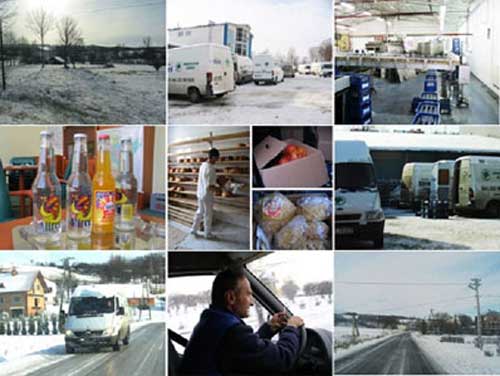“ALFRED” FOOD AND DRINKS DELIVERY

Delivery of mineral water and food from the Strug Valley to the individual customers in the cities
Key Innovation
Enabling farmers from the Strug Valley to sell their organic products by organizing a delivery network to individual customers in the cities.
Problematic background and context
The Strug Valley is a microregion containing 4 communes, around 20 km from Rzeszów. Small farms are frequent in this area, with traditional farming methods, where the average size is slightly larger than 3.5 ha. There are also companies (services, construction) and co-operatives here. The region’s soil is of average quality. There are mineral water deposits. The region has a high unemployment rate, which is the result of urban factory lay-offs. The first independent telephone co-operative in Poland came into being as a result of co-operation between local self-governments with an American foundation. This successful undertaking encouraged the taking up of further initiatives. It was decided to create a program to support the development of activity and to combat high unemployment and alcoholism. In the framework of the Sami Sobie program, Chmielnik Ltd. came into being in 1995.
Solution description
The Chmielnik company ensures work in the region and provides the individual recipient with healthy, cheap and naturally made products. It began by distributing mineral water, and with time expanded its product line to include vegetables, fruit, honey, bread, poppy seeds, soups, and pasta. The line is broadened to include additional products before holidays. The mineral water, juices and drinks are sold in glass bottles (0.33 l) and 19 l poly-carbon returnable containers. To become a client, you place an order (by telephone or Internet), and the goods are brought to your home either weekly or every two weeks. The company has two bases and 160 vehicles, with which their products are brought to 4 provinces (Cracow, Rzeszów, Tarnów and Lublin) and to 70,000 recipients. Every distributor has their own region. While collecting, for example, empty bottles, the goods are brought to the home at a pre-arranged hour. 10% of the company’s proceeds go to Caritas (to charity).
Timeframe
from 1995. Delivery weekly or every two weeks
Development phase
Diffusion:
Food delivery services exist in different shapes, mainly it is mineral water that is distributed similar way as Alfred. The unique thing of Alfred sevice is the distribution of vegetables and other food products having the same source of organic production.
Maturity:
At first the company shipped mineral water to nearby towns, gradually broadening its product line with drinks, juices, fruits and vegetables, semi-finished products like poppy-seeds, and prepared products, like bread. The new products, for which the demand is not decreasing, are slowly starting to be produced by the company. For example, a bakery is now situated next to the company; another example is the zurek soup, which was previously made outside of the region, and is now made within it.
Revenue/costs model
The goods received are payable at the time of reception (or within 30 days). The distributors receive a steady wage, increased by a commission depending on the quantity of the quota reached (paid by Chmielnik Ltd.) Clients pay when they receive the goods. In periods where the demand is lower, the number of people employed stays the same, doing work, for example, in water production.
Social evaluation
Solution: -guaranteed employment for people living on farmlands -supporting a traditional and healthy method of making products, and promotion of the advantages that result – promotes dialog with clients through the shippers bringing the goods (improving the services through a keener awareness of needs) – stimulates entrepreneurship, facilitating the development of other forms of village undertakings, such as: agro-tourism, eco-tourism, and handicrafts.
Environmental evaluation
This solution supports traditional lifestyles in the countryside, as well as traditional produce growing and animal breeding (with no chemical agents, on a small scale – the average size of the farms is just over 3 ha.). It also promotes natural products made in a traditional way, such as honey of various sorts (thanks to the existence of bees, the flowers are pollinated, which allows the delicate eco-system to endure).
Economical evaluation
The solution is often used by families because it ensures easy and time-saving access to essential products. The prices are competitive with the same products in the stores. The reduction in the number of middle-men between the producer and the recipient has an impact here. Even if the prices turn out to be much like those in the shops, an additional advantage of the Chmielnik products is that one knows where they come from and that the quality will be good. The company receives many orders for mineral water.
Authors
Dominika Konieczkowska, Magdalena Misaczek, Ela Tluszcz / Academy of Arts in Cracov / Poland